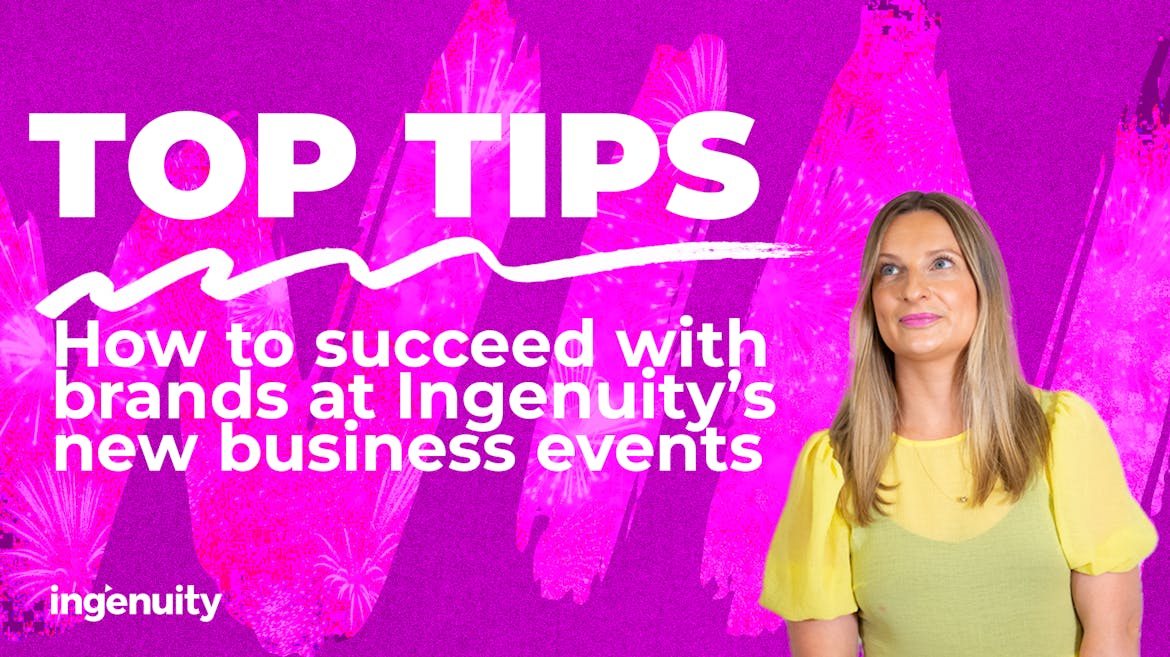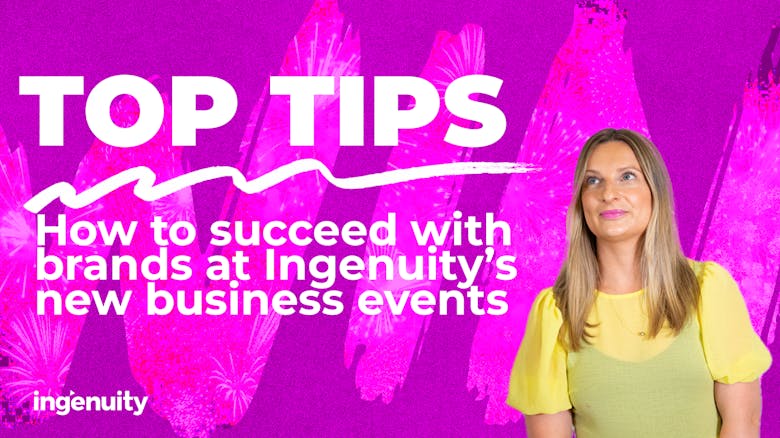
How to succeed with brands at Ingenuity’s new business events
Emma RobsonFor 16 years we’ve run speed-dating events for agencies and brands looking to find their perfect partners. Our events are famously known to open the door for agencies, of all shapes and sizes, to previously inaccessible household-name brands. On the day, an agency sells itself, its team, and its services, to between 10 and 15 potential new clients and, if there’s chemistry, a new business relationship is born.
With our new business events driving so much success for agencies in 2022, we’re hoping 2023’s calendar of events will be no different. But how can agencies get the most out of the day?
A lot of agencies ask us, "How can we pitch ourselves right based on the brief?"
Before the day, brands in attendance will send us their brief. This document can be anything from a page of notes to a full RFP. While it always feels strange to say this, it’s important that an agency doesn’t attempt to cover everything captured by the brand within the brief. You only have 20 minutes to make an impression, so pick one or two key points that resonate best with your agency and your services, focus on those, and leave the rest for a follow-up meeting when requested.
Interpreting the brief can be tricky but what’s even more difficult is not knowing until you’re in the room if you’ve nailed it. It’s important to communicate with our internal team so we can act as the middleperson if you need further clarification about what’s being asked.
In addition to getting the brief right, an agency needs to do as much research as possible to avoid spending time asking questions on the day. Know what the brand stands for, know who the people are in the room, and rinse any other bits of information you can get hold of beforehand to avoid wasting time doing so on the spot. Time should be spent on their challenges!
You’re going to meet with decision-makers. These guys get approached by agencies all the time, so you should spend time focusing on your USP. Where do you differentiate yourself? How does this match up with their current requirements? What’s your version of, ‘this is why you should choose us; this is how we can add value to your current agency roster’?
Sell your uniqueness but leave room for humility and honesty. If you don’t have any experience, or you’re not specialised in certain areas of the brief, be honest. There might be other projects the brand is investigating that’s right for you. So, champion what you’re good at and leave the bits you don’t know to other agencies there on the day.
Another common agency question is "What does it take to stand out?"
The best-prepared agencies naturally do well, but it’s the ones that really focus on the brand’s specific challenges and have a personalised approach that stand out most. A generic response doesn’t work well with brands. Brands have shared their challenges beforehand and expect the agencies to focus wholeheartedly on responding directly to those requirements. Don’t go off-piste and talk about your wider agency too much.
Building a storyboard is a successful, tangible way of getting a ‘yes’ on the day. I remember a particular instance when an agency built 15 different storyboards, which garnered much praise from brands in attendance. PowerPoint presentations are great if you have digital elements to show off, but a little imagination on how to highlight your ideas and expertise goes a long way.
More often than not, agencies pre-select their top brands or prospects and ultimately end up finding out post-event, or at the networking drinks, that the four brands they were most interested in meeting were actually ‘duller’ opportunities. And the ‘less interesting’ brands often provoke ‘surprise and delight’ moments. There’s often a project in hand or a review an agency unexpectedly wants to work on. Going into a room with the mindset that ‘this one isn’t really for us’ but then coming out of it thinking ‘that’s right up our street and we really get on with them’, and vice versa, is quite common.
Walking in with realistic expectations is important. Understand you might not be everyone’s cup of tea and if one meeting doesn’t go to plan park it and go into the next one brimming with confidence. Keep a good mental attitude and bring the right energy into the room.
Tips for agencies during their presentation
Set the scene with how you’re going to approach the brief but ask the brand to explain a little bit about the opportunity and its origins at the start. This avoids pitching back to them anything that you’ve prepared which, on reflection, might be irrelevant.
The first question agencies should ask is, ‘This is how we’ve interpreted the brief, is that correct?’ Remember brand marketers are busy bees and the brief might not be detailed; something along the lines of ‘we want to gain more social media followers, we currently use these channels and we’re thinking about doing this’ is not uncommon.
There are so many ways that you can interpret that challenge, which is the point of meeting 10-15 agencies on the day. It’s a good idea to understand the unwritten desires and ideas from the start. Do they want a strategic approach? Or do they want to be wowed with creative?
Ask the question and repeat their answer back to them e.g.: ‘Just so I’m clear, you’re interested in strategic metrics and ROI vs creative.’ Allow their answer to dictate what comes next - whether that be a particular case study or a wild idea.
Making a good first impression
First impressions count and, like any interview setting, brands will review your body language, appearance, and general introductions. Historical advice might sound like ‘make an effort to dress smartly, without removing all elements of your personality; smile and bring a firm handshake’.
But now, I think it’s more about embracing what your agency USP is with the right energy and focusing on your value-add to the brand.
Using networking drinks to your advantage
Because we’re doing more and more events, we’re running multiple events on the same day. So, at our networking drinks there’s a lot of opportunity to meet with brands you haven’t encountered during the day. For example, if we’re running a PR event on one floor of the stadium, and we’re running a CRM event on another, the agencies that have met the CRM brands won’t have met the PR brands, and vice versa.
Brands really enjoy the networking drinks; to see agencies in an outside-of-work environment. Some brands come to me and ask to change their feedback forms from ‘no’ to ‘yes’ when the evening is over. It’s too good a session to miss.
To use this session to your advantage. Mingle, mingle, mingle. Find common interests. Remove your business hat (even if it’s just for a moment) and connect on a human level. Relax and enjoy – that’s what networking drinks are for!
How an agency should follow up with brands
Getting a ‘yes’ at the event doesn’t guarantee a meeting unless your follow-up is on the money. You need to a) stand out and b) ensure that you’re joining the dots from the conversations that took place on the day.
If it goes well, liaise with our team to make sure that there’s a meeting in the diary. A brand with an immediate requirement requires a prompt second meeting; momentum is everything!
When it comes to your personal ‘nice to meet you’ follow-ups, humour always works well. This is especially true in email subject lines, which I’d say is the preferred method of thanking the brand for their time, as opposed to calling. Share something funny about the event or a moment or aspect where you connected well with the brand. Remember, a brand will potentially receive five emails after each event so it’s important to stand out. ‘It was great to meet you at the event, please come and talk to me’ is underwhelming and overused. It must be a more personable - and personalised - approach.
Timing is also crucial. Follow up sharpish after the event; if you can determine in your meeting what kind of timescales the brand is working to, you can better judge the tone of follow-up communication. If you’ve had a great meeting with a brand and they’ve said they’re really interested in working with you in the future rather than now, reconnect and suggest you’ll drop another message in two months’ time. Just don’t forget to schedule a diary reminder!
Subscribe to Ingenuity’s content hub
Receive the latest interviews, insights and trends straight to your mailbox.

